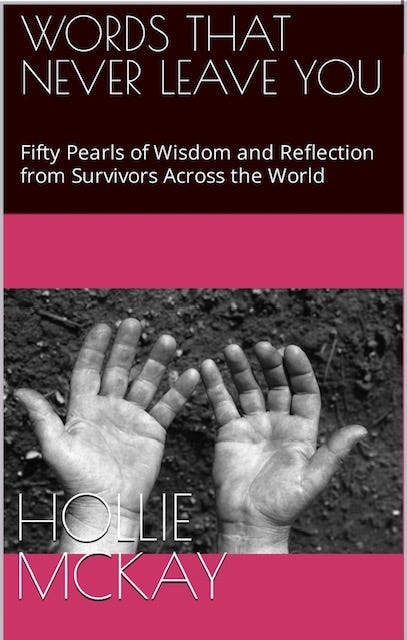Words that Never Leave You: "If you can do the work, you should do the work. And if you do the work, it will matter."
Part Thirty-Eight in an ongoing series from Hollie's book "Words That Never Leave You: Fifty Pearls of Wisdom and Reflection from Survivors Across the World."
During the mourning, mayhem, and uncertainty following World War II, a passionate 25-year-old legal secretary volunteered to leave her Southern California home to take on an unpopular project: representing some of Japan’s most heinous war criminals at what is known as the “Tokyo Trials.”
I had the pleasure of meeting this extraordinary woman, Elaine Fischel, in 2016 when she was 95. Over cups of tea in her Los Angeles home – dotted with pink curtains, black-and-white photographs holding her treasure chest of memories, and the unmistakably bittersweet scent of persimmons and the timeworn, musty books – she led me down history’s path. Elaine guided me into the moments that ultimately determined the structure of all war crimes tribunals going forward.
Originally, Elaine wanted to work for the prosecution, however, officials assigned her the defense instead. But for this wide-eyed and aspiring attorney, standing beside and representing the enemy presented an unusual challenge: advocating for the men who had orchestrated atrocities such as Pearl Harbor, the Rape of Nanking, and the atrocious torture and transfer of Filipino and American prisoners of war, known as the Bataan Death March.
It was perhaps ironic that her patriotic pride compelled her to take on such an unpopular assignment.
“The US didn’t want what they called vigilante justice – a ‘we’ll take ’em out and shoot ’em’ approach,” Elaine, who served as the official legal secretary, explained in earnest. “It was agreed to give them a proper trial.”
Throughout the wartime years, Elaine – like many Americans – had developed an intense hatred for the Japanese, whose forces she blamed for the deaths of many of her friends. Yet, as Elaine became entangled in the personal lives of Japan’s disgraced leaders, her perceptions of the enemy began to change.
“I really thought the Japanese were horrible people,” she confessed. “The turning point was when the 15-year-old daughter of one of the defendants came to me and asked if she could see her father.”
For years, Elaine put her American life on hold, rebuffing the criticism and confusion of friends and family who could not comprehend her perspective. But unpopular work is often the most important work of all, and during times of disillusionment with my own work, I often recite Elaine’s words out loud.
“If you can do the work,” Elaine once said to me over dinner, the afternoon sunshine pooling over her kind face. “You should do the work. And if you do the work, it will matter.”
PURCHASE YOUR COPY OF “WORDS THAT NEVER LEAVE YOU” TO READ MORE REFLECTIONS AND ANECDOTES
** Short read of meaningful lessons gleaned from the ordinary forced to become extraordinary
For speaking queries please contact meta@metaspeakers.org
For ghostwriting, personalized mentoring or other writing/work-related queries please contact hollie@holliemckay.com
I am also available for a select number of private coaching sessions for those wishing to write a book or venture into the foreign journalism space. Please contact directly for rates hollie@holliemckay.com
PLEASE CONSIDER A PAID SUBSCRIPTION TO THIS SUBSTACK TO KEEP INDEPENDENT JOURNALISM ALIVE.




